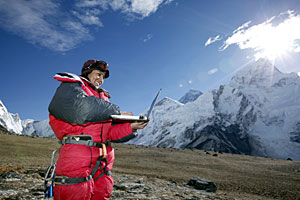 |
STOCKHOLM--Many in Nepal know that Ncell used to be Mero Mobile, but what they probably don't know is that it is part of a multinational company that is the sixth largest service provider in Europe, TeliaSonera.
Telia is from Finland, the land of Nokia, and Sonera is from Sweden, where the world's first mobile phone was installed in a car in 1956. The two countries have been at the forefront of innovation in mobile telephony ever since. TeliaSonera this year introduced mobile broadband 4G service in Sweden because it said rest of the world was too slow to adopt the data service.
"We want to be first," TeliaSonera's VP for System's Development, Tommy Ljunggren, told Nepali Times in Stockholm recently. "We want to pioneer the next generation of networks in Eurasia."
Among the firsts that TeliaSonera boasts of in its promotional materials and website is that last year it installed "the world's highest 3G" at the base of Mt Everest in Nepal. In fact, among the 18 countries where it operates through subsidiaries or partners in Europe and Asia, TeliaSonera's Nepal operation has registered the highest growth rate.
"Growth in Nepal has really surprised me," admits Tero Kivisaari, president of TeliaSonera's Eurasian operations, "I think we got the timing right. And if the political situation stabilises Nepal's location between India and China will mean it has fantastic potential for growth in the telecom sector."
Ncell has now overtaken Nepal Telecom (NT) to become the largest provider in Nepal. The company is investing $100 million in new technology every year, and is even providing equipment upgrades to NT so as to remove the gateway bottlenecks that has affected connectivity.
Says Kivisaari: "Nepal is very important for us right now, we have doubled year-to-year revenue in the third quarter of 2011, and we did it by having a good network, good quality and good coverage."
However, not everything is smooth sailing in Kathmandu. TeliaSonera has a 'clean company' policy and this can affect day-to-day functioning when corruption, extortion and erratic government policy are the norm. Parliament's Public Accounts Committee this week is retroactively scrutinising the 3G license, so the company has put its plans to upgrade to 4G on hold. Vendors selling SIM cards are resisting attempts by Ncell to stop overcharging.
Although the mobile penetration rate in Nepal is growing exponentially, average revenue per customer is much lower than in other countries whereas investment is three times higher because of terrain, provisioning base stations for power cuts and lack of access. In November Ncell says it had its first day with no reported defects in its network.
For Ncell's Pasi Kostinen it is a daily struggle to battle the bureaucracy and red tape to get permits, visas for expat staff or clearing equipment through customs. "We appreciate there are procedures, but it takes so much time sometimes it is frustrating," he says,"it requires a lot of patience in Nepal, but we have the patience because we believe this country has so much opportunity."
The biggest headache has been the connectivity problem between Ncell and NT. "Our customers think it is our fault," says Koistinen, although he adds connections have become smoother in the past two weeks. Ncell is also investing in adding capacity for Kathmandu Valley where demand has grown sharply.
Ncell's focus has been to provide the best quality service for Kathmandu, take 3G beyond the current 16 metros and upgrade to 4G when the frequency is allocated. In early 2010, when Ncell took over Mero and rebranded the company it inherited 100 base stations, today there are 1,600.
"I blog to let off steam"
When asked how often he updates his blog, Ncell CEO Pasi Kostinen says:
"It depends how angry I am. I blog to let off steam, it gives me relief to vent it out."
The Finn says he blogs to explain telecom technology to readers, give reasons why things are the way they are. He uses self-deprecating humour, and famous Finnish understatement to get his point across. Some recent excerpts:
• We are two different kinds of operators (in Nepal): we at Ncell want to be very much quality oriented, whereas NTC seems to believe that price is the main value creator for customers. Good. It is important to have alternatives for consumers to choose.
• Please, no "Ncell sucks" posts or "put tower in my village".
• Good news in the end. We thank NTC for allowing our customers, YOU, enough capacity during peak hours to call their network!!
Read also:
"We are now building capacity"
In the dark, PAAVAN MATHEMA
The Rastra Bank's interest rate relief for hydro developers may be too little too late


